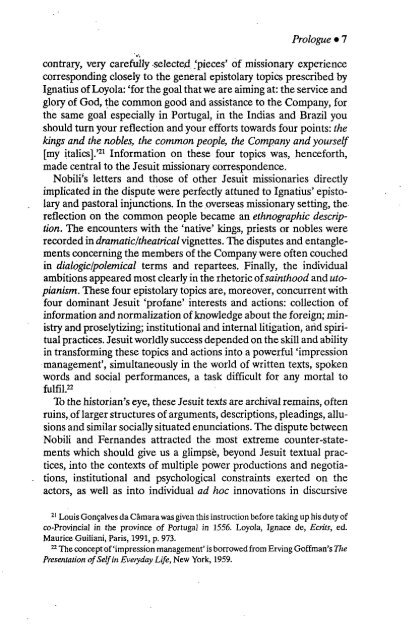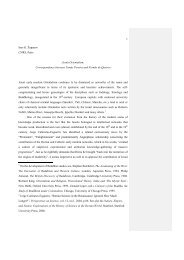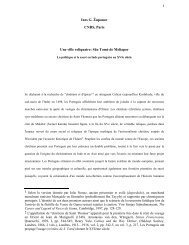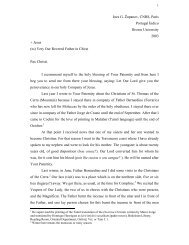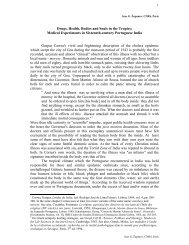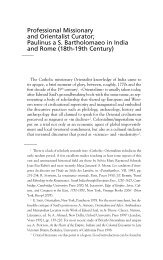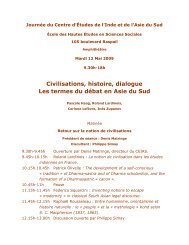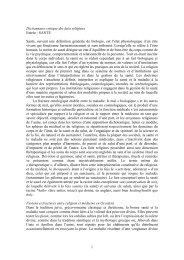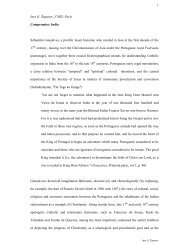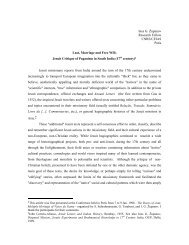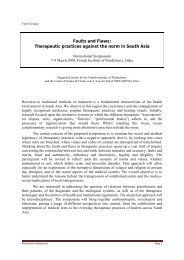INES G. ZUPANOV - Ines G. Županov
INES G. ZUPANOV - Ines G. Županov
INES G. ZUPANOV - Ines G. Županov
Create successful ePaper yourself
Turn your PDF publications into a flip-book with our unique Google optimized e-Paper software.
Prologue • 7<br />
contrary, very carefully selected, .'pieces' of missionary experience<br />
corresponding closely to the general epistolary topics prescribed by<br />
Ignatius of Loyola: 'for the goal that we are aiming at: the service and<br />
glory of God, the common good and assistance to the Company, for<br />
the same goal especially in Portugal, in the Indias and Brazil you<br />
should turn your reflection and your efforts towards four points: the<br />
kings and the nobles, the common people, the Company and yourself<br />
[my italics].' 21 Information on these four topics was, henceforth,<br />
made central to the Jesuit missionary correspondence.<br />
Nobili's letters and those of other Jesuit missionaries directly<br />
implicated in the dispute were perfectly attuned to Ignatius' epistolary<br />
and pastoral injunctions. In the overseas missionary setting, the<br />
reflection on the common people became an ethnographic description.<br />
The encounters with the 'native' kings, priests or nobles were<br />
recorded in dramatic/theatrical vignettes. The disputes and entanglements<br />
concerning the members of the Company were often couched<br />
in dialogic/polemical terms and repartees. Finally, the individual<br />
ambitions appeared most clearly in the rhetoric of sainthood and utopianism.<br />
These four epistolary topics are, moreover, concurrent with<br />
four dominant Jesuit 'profane' interests and actions: collection of<br />
information and normalization of knowledge about the foreign; ministry<br />
and proselytizing; institutional and internal litigation, arid spiritual<br />
practices. Jesuit worldly success depended on the skill and ability<br />
in transforming these topics and actions into a powerful 'impression<br />
management', simultaneously in the world of written texts, spoken<br />
words and social performances, a task difficult for any mortal to<br />
fulfil. 22<br />
To the historian's eye, these Jesuit texts are archival remains, often<br />
ruins, of larger structures of arguments, descriptions, pleadings, allusions<br />
and similar socially situated enunciations. The dispute between<br />
Nobili and Fernandes attracted the most extreme counter-statements<br />
which should give us a glimpse, beyond Jesuit textual practices,<br />
into the contexts of multiple power productions and negotiations,<br />
institutional and psychological constraints exerted on the<br />
actors, as well as into individual ad hoc innovations in discursive<br />
21 Louis Gonçalves da Cámara was given this instruction before taking up his duty of<br />
co-Provincial in the province of Portugal in 1556. Loyola, Ignace de, Ecrits, ed.<br />
Maurice Guiliani, Paris, 1991, p. 973.<br />
22 The concept of 'impression management' is borrowed from Erving Goffman's The<br />
Presentation of Self in Everyday Life, New York, 1959.


